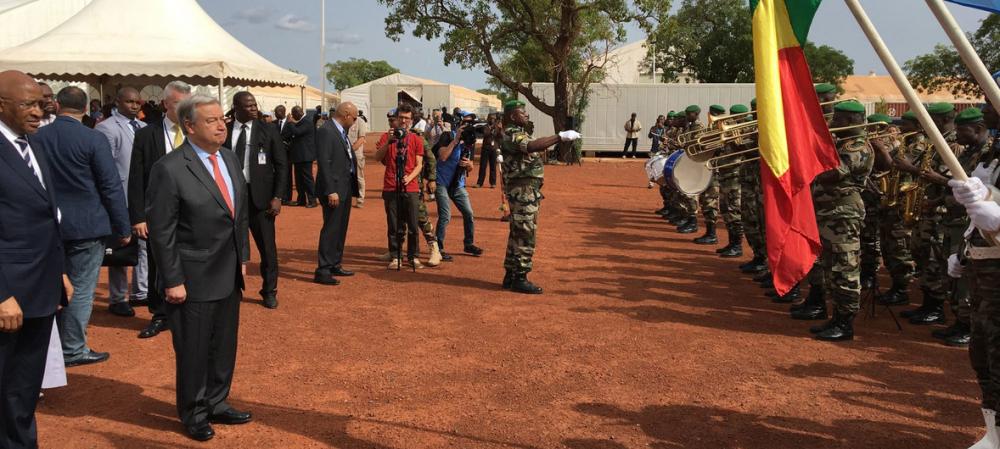Just Earth News | @justearthnews | 30 May 2018, 11:55 am Print

New York: United Nations Secretary-General António Guterres arrived in Mali on Tuesday, to honour the service and sacrifice of peacekeepers around the world, and mark the official International Day of UN Peacekeepers.
The north-west African country is the most dangerous place in the world to be a UN ‘blue helmet’, and last year, 21 troops serving with the UN Stabilization Mission in Mali (MINUSMA) lost their lives, together with seven civilians.
“Dear peacekeepers, you have demonstrated that you are capable of all forms of sacrifice. For many of your colleagues, this has meant the supreme sacrifice of giving their lives, to protect the lives of Malian civilians,” Guterres said at the ceremony. “I want to thank you very much for this effort, these sacrifices, to pay tribute to you, and to say how proud I am to work with you”.UN News has a team in Mali to cover the special visit, and shortly after arriving in the capital, Bamako, the Secretary-General attended a poignant ceremony at MINUSMA’s base in the capital, to pay tribute to fallen peacekeepers. He laid a wreath at the memorial inside the camp, engraved with the names of those killed in the service of peace.
“As peacekeepers, you are the foremost symbol of the United Nations itself”, he added.
The Special Representative of the Secretary-General in Mali, and Head of MINUSMA, Mahamat Saleh Annadif, said that honouring the fallen “warms the hearts of their comrades and encourages us to continue to defend even more resolutely the values of the United Nations”.
Medals for two peacekeepers
Guterres also awarded medals to two peacekeepers serving with the mission, for their outstanding service: Commander Olufunmilayo Ajibike Amodu, from Nigeria, and Major Mohammad Badrul Ahsan Khan, from Bangladesh, a military staff officer based at Force headquarters.
“The medal is very important. It symbolizes what it is to be a peacekeeper at MINUSMA”, said Commander Amodu, in an interview for UN News. “Receiving it from the Secretary-General is a very unique privilege.”
“The terrorists are not relenting in what they are doing. And obviously, we are not backing out in what we have come to do”, she added, pointing to the worrying security situation in Mali, particularly in central and northern areas where most of the continuing violence between different armed groups and government forces is taking place. Troops with the mission have increasingly become the target of attacks.
For those interested in serving as ‘blue helmets’, Commander Amodu had this message: “The UN is all about peace. And when there is peace, there is development. When there is peace, there is promotion of technology. When there is peace, every other thing works the way it should work. And for any person who would want to join MINUSMA, you should have in the back of your mind that when you are coming, it is to support the peace process”.
Major Khan told UN News here on the ground in Bamako that it was “a matter of pride and honor” to receive the medal. “In this world, we have to be all together. So, for better living, we have to ensure the peace. There is no better alternative to supporting each other”, he said, adding that “MINUSMA is a unique opportunity to serve”.
Regional visit on Wednesday
Guterres is being accompanied on his two-day visit to Mali by Under Secretary-General for Field Support, Atul Khare, the head of UN Peacekeeping Operations, Jean-Pierre Lacroix, and the Executive Director of UNICEF, Henrietta Fore.
The UN chief was greeted at the airport by Malian President Ibrahim Boubacar Keita, who he was scheduled to meet later in the day. During his visit, Guterres will also meet other Malian officials, as well as United Nations staff working in the country.
On Wednesday, the Secretary-General is expected to visit the regions and to meet with local authorities and UN staff, as well as women, youth and religious representatives.
MINUSMA/Olivier Salgado
- Ali Khamenei (1939–2026): Iran’s Supreme Leader who ruled with an iron grip
- Trump signs 10% global tariff, says it takes effect ‘almost immediately’
- BJP wins a seat in Bangladesh — But not the one you think!
- Meet Shabana Mahmood: Could she take over as UK’s first Pakistani-origin Muslim PM?
- Dalai Lama's Office breaks silence on Epstein claims





-1763561110.jpg)
